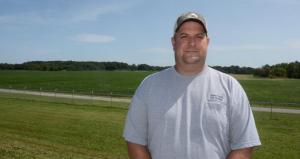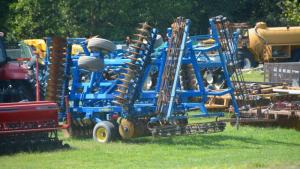Sussex County is in the farming business.
Last fall, county employees planted a cover crop followed by soybeans and corn on the 330 spray irrigation acres of the Wolfe Neck treatment facility and another 120 acres just outside the boundaries.
For nearly three decades, the county has leased out the parcel, adjacent to Cape Henlopen State Park, to a farmer, but it has not worked to the county's satisfaction. “History has proven it doesn't work,” said Hans Medlarz, the county's chief engineer.
In order to have more control over its spray irrigation wastewater disposal system at the facility, Sussex County Council officials have been purchasing farm equipment over the past few months. One of the last major purchases - a $184,800 combine and two harvesting heads - was approved at council's Aug. 29 meeting.
Medlarz said the farmer's schedule for planting and harvesting, and the county's schedule for spraying have not matched up well enough for leasing to work. He said last year alone the county lost 125 days of spray time, and most of those were related to farming.
“This will greatly reduce the number of lost days. We have no other option than to take over the operation,” Medlarz said.
With the country in control of the farming operation this year, only 17 days of spray time have been lost, said County Administrator Todd Lawson. “The decision to enter the farming business was made because we felt if we controlled both the farming and the spraying, we could see a more effective method of disposal at our site,” he said. “This did not require any new staff - we have very capable county staff with farm backgrounds who took over the management of the operations.”
County employees who are also part-time farmers could be paid overtime to work the fields if necessary, Medlarz said. The county will then reap the profit from all crops. In the past, the tenant farmer sold the crops.
One of those part-time farmers and county employees is Brian Marvel, Wolfe Neck district manager, who has been involved with his family farm in Selbyville his entire life. He said he never imagined his farming background would pay off as part of his county work duties.
“Farming this land ourselves will help us out dramatically,” he said.
The county's farm has 200 acres of corn and 250 acres of soybeans awaiting harvest - corn in mid-September and soybeans in mid-October.
Based on recent prices per bushel for corn and soybeans, the county could make as much as $250,000 to $300,000 from this year's harvest.
Lawson said the county pays the state $61,250 to lease the property, and $275,000 was budgeted this year to purchase the needed equipment and supplies to support the farming operation.
When a tenant farming lease terminates at the county's Inland Bays treatment plant near Long Neck, the equipment will be used to farm that land as well. Medlarz said that timing should coincide with the schedule for the Wolfe Neck spray operation to be converted to a more natural operation with fixed heads spraying on a newly planted forest with access to Cape Henlopen State Park. The existing spray irrigation rigs from Wolfe Neck will be used for spare parts, Medlarz said.



























































